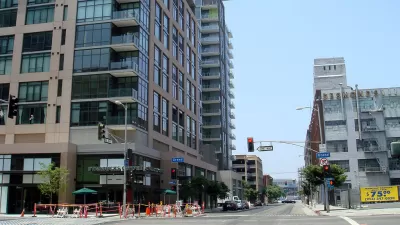Chinese developers are pouring money into high-rise housing projects in Los Angeles. But will these be pieds-a-terre for absent buyers? And how are developers dealing with the American regulatory environment?

To a large extent, Asian money is driving much of the current development in Downtown L.A. Developed by Korea's Hanjin Group, the Wilshire Grand Center is currently the tallest building on the West Coast. And in recent years, David Pierson writes, "Chinese developers such as Greenland, Oceanwide and Shenzhen Hazens are pouring billions into the neighborhood, adding thousands of new residential units in soaring skyscrapers that will fundamentally change the city's skyline."
"'When all these megaprojects are finished, they’re going to have to reshoot the postcard picture of downtown L.A.,' said Mark Tarczynski, executive vice president for Colliers International's L.A. office."
Flush from the go-go building climate in cities like Shanghai and those surrounding the Pearl River Delta, Chinese developers have had to get used to a safer, more regulated approach in the United States.
In addition to the usual anti-development arguments, a concern on the American side is that Chinese developers "can rely on both local and Chinese-based home buyers to scoop up their condos. [...] Some downtown L.A. residents have expressed concern that Chinese investors will leave their properties empty — a phenomenon common in China and antithetical to the dense urban neighborhood many local boosters have long championed."
Taxes are also structured differently between both countries. "In China, there's no real property tax, so local governments rely on land sales for more than a quarter of their revenue. That gives them every incentive to expedite real estate development."
FULL STORY: They built towering new cities in China. Now they're trying it in downtown L.A.

Alabama: Trump Terminates Settlements for Black Communities Harmed By Raw Sewage
Trump deemed the landmark civil rights agreement “illegal DEI and environmental justice policy.”

Study: Maui’s Plan to Convert Vacation Rentals to Long-Term Housing Could Cause Nearly $1 Billion Economic Loss
The plan would reduce visitor accommodation by 25% resulting in 1,900 jobs lost.

Planetizen Federal Action Tracker
A weekly monitor of how Trump’s orders and actions are impacting planners and planning in America.

Grand Rapids Mayor Proposes Garage Conversion Plan
The mayor says allowing homeowners to convert garages to dwelling units could alleviate the city’s housing shortage.

Baltimore Ordered to Improve Sidewalk Accessibility
The city is one of many to face lawsuits for failing to comply with the Americans with Disabilities Act.

This Toronto Suburb Has More Bus Riders Than Columbus, Ohio
Brampton, Ontario used gradual improvements in service to prove that if you build it, they will ride.
Urban Design for Planners 1: Software Tools
This six-course series explores essential urban design concepts using open source software and equips planners with the tools they need to participate fully in the urban design process.
Planning for Universal Design
Learn the tools for implementing Universal Design in planning regulations.
Smith Gee Studio
Alamo Area Metropolitan Planning Organization
City of Santa Clarita
Institute for Housing and Urban Development Studies (IHS)
City of Grandview
Harvard GSD Executive Education
Toledo-Lucas County Plan Commissions
Salt Lake City
NYU Wagner Graduate School of Public Service





























